Review
“Gladiator II” strides into the cinematic arena with the formidable legacy of its 2000 predecessor weighing heavily on its shoulders. Directed by Ridley Scott, who masterfully helmed the original “Gladiator,” this sequel endeavors to capture the grandeur of ancient Rome while introducing fresh characters and narratives. Critics and audiences alike have been divided in their reception, creating a battleground of opinions that potential viewers should consider.
At the heart of “Gladiator II” is the story of Lucius Verus (Paul Mescal), the son of Lucilla and nephew of Commodus from the first film. Mescal’s portrayal of Lucius attempts to blend vulnerability with the burgeoning strength required to navigate Rome’s treacherous political landscape. Critics from Rotten Tomatoes have praised Mescal’s performance for bringing a nuanced depth to the character, though some sentiment in Metacritic suggests that he occasionally lacks the commanding presence Russell Crowe brought to Maximus. Viewer feedback on platforms like IMDb mirrors this sentiment, with many appreciating Mescal’s fresh take while missing the raw intensity of the original hero.
Denzel Washington’s role as Macrinus has been a standout, with many critics lauding his performance as “Oscar-worthy” and a highlight of the film. Washington brings a gravitas that anchors the narrative, offering a performance that resonates deeply with audiences. Reviews on Variety highlight Washington’s ability to convey complex emotions, making his character both formidable and empathetic. This has been echoed by viewers who find his portrayal adds a rich layer to the film’s dramatic tension.
The supporting cast, including Pedro Pascal, Joseph Quinn, and Connie Nielsen reprising her role as Lucilla, provides a solid foundation for the unfolding drama. Pascal’s charismatic presence and Quinn’s dynamic energy have been noted as strengths, though some critics argue that the ensemble lacks the cohesive chemistry seen in the original film. On CinemaBlend, discussions often focus on how the supporting actors contribute to the film’s depth, with many appreciating their efforts despite occasional narrative inconsistencies.
Ridley Scott’s direction remains a double-edged sword in the eyes of critics and audiences. While his ability to craft visually stunning scenes and capture the essence of ancient Rome is widely praised, some feel that the emotional depth and narrative coherence do not quite match the original. Reviews on The Guardian commend Scott’s attention to detail and the film’s epic scale, yet point out that “Gladiator II” sometimes prioritizes spectacle over substance, resulting in a plot that may feel convoluted to some viewers. This dichotomy is reflected in audience ratings, where the movie holds a respectable score but is often compared unfavorably to its predecessor in terms of emotional engagement.
The visual effects in “Gladiator II” are a standout feature, benefiting from two decades of technological advancements since the first film. The battle sequences are particularly lauded for their intensity and realism, creating immersive experiences that draw viewers into the action. IGN praises the film’s CGI for enhancing the storytelling without overshadowing the human elements, although some critics argue that at times, the effects can be too overwhelming, detracting from the character-driven aspects of the plot. Audience reactions on social media platforms like Twitter suggest that while many enjoy the high-octane visuals, others feel that the film occasionally sacrifices narrative coherence for visual grandeur.
“Gladiator II” also attempts to expand the universe of the original film by delving deeper into Roman politics and the personal vendettas that drive its characters. This broader scope has been met with mixed reviews. Some critics on RogerEbert.com appreciate the expanded narrative and the attempt to build a more complex world, while others feel that the sequel struggles to maintain the tight focus that made “Gladiator” so compelling. Viewers on Letterboxd have echoed these sentiments, with discussions centered around the film’s ambition versus its execution.
The musical score, composed by Hans Zimmer in collaboration with Lisa Gerrard, returns to the powerful and evocative themes that fans loved in the original. The soundtrack is frequently highlighted in reviews for its ability to enhance the emotional and dramatic moments of the film, providing a sonic backdrop that complements the on-screen action. Fans on Soundtrack.net have particularly praised the score for its grandeur and emotional resonance, making it a standout element of the sequel.
One of the primary points of contention among critics is the film’s pacing. While the original “Gladiator” masterfully balanced action with character development, “Gladiator II” has been criticized for its uneven tempo. Some reviews on Empire Online note that certain segments drag, disrupting the film’s overall flow. In contrast, other sections, particularly the gladiatorial combats and political intrigue, have been praised for their intensity and engagement. Audience feedback reflects this divide, with some viewers enjoying the varied pacing and others finding it detracts from the overall experience.
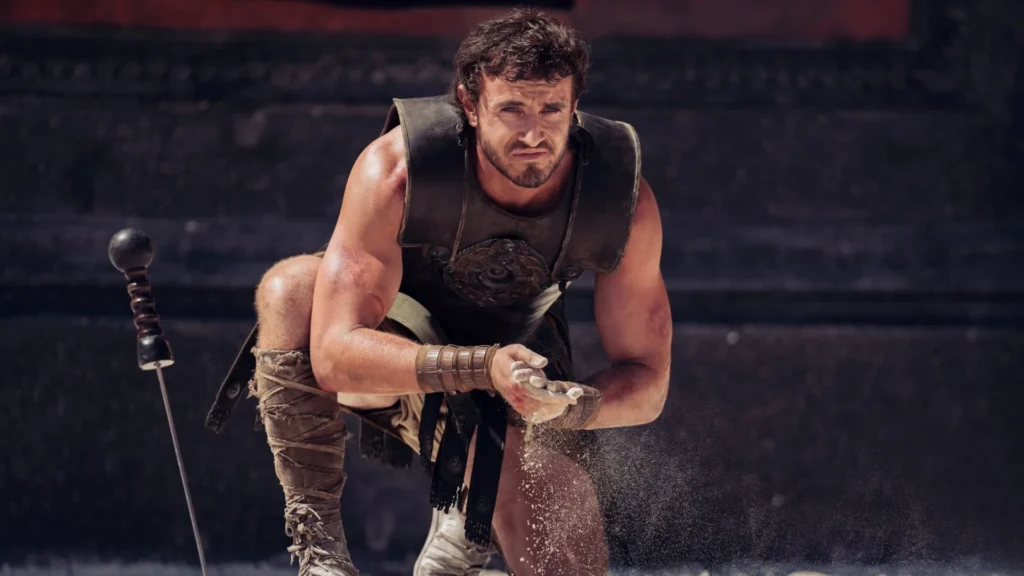
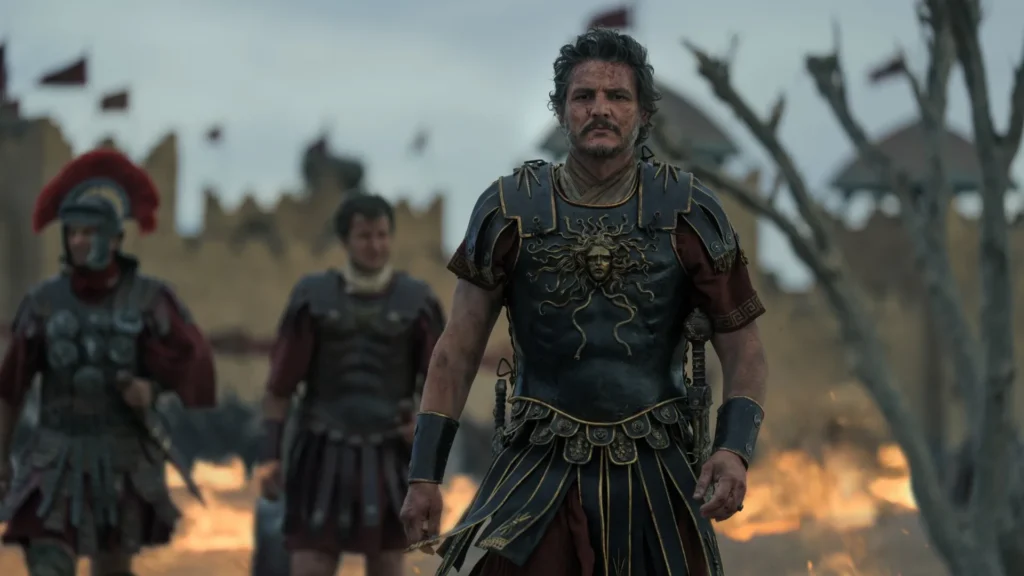
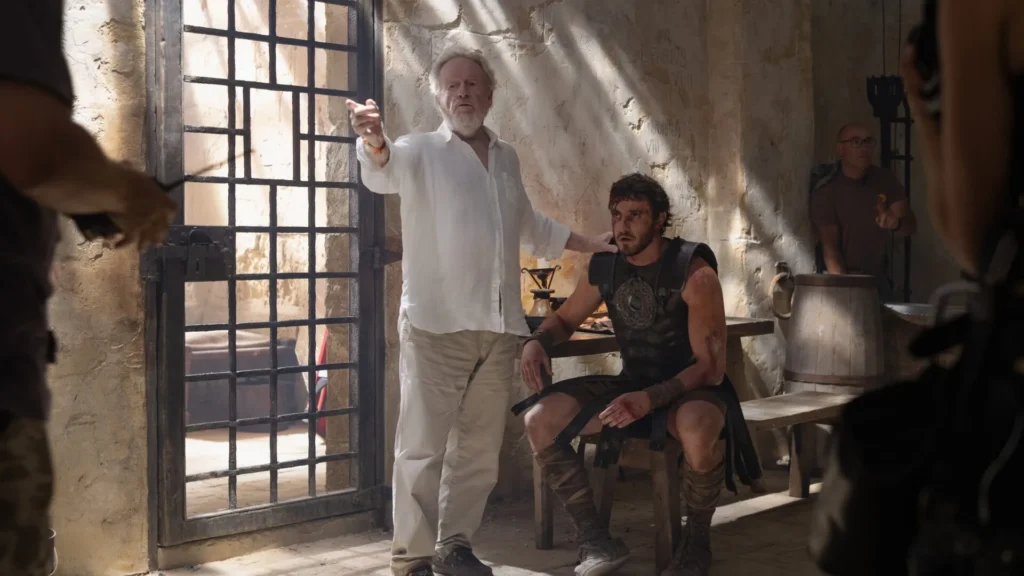
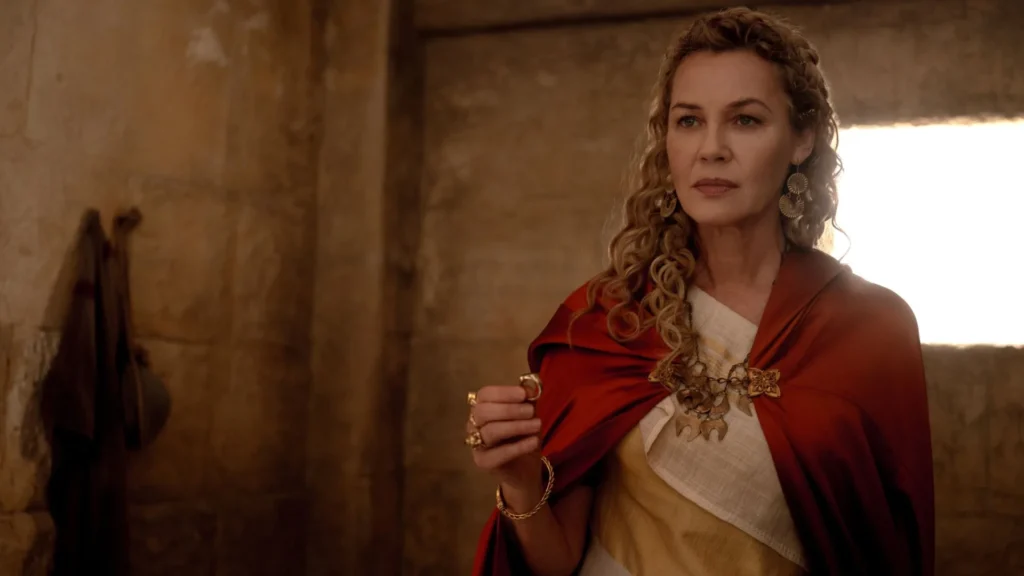
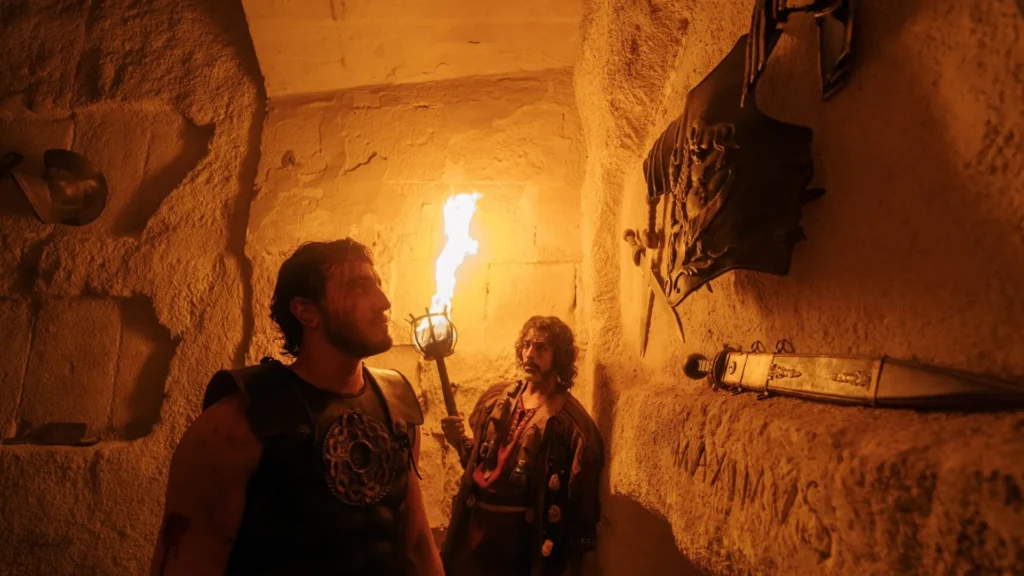
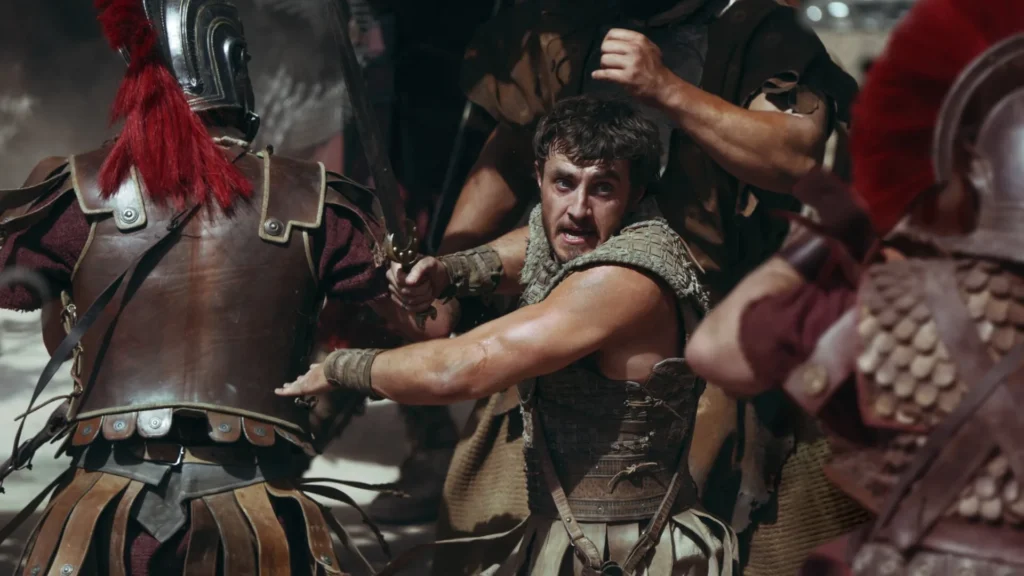
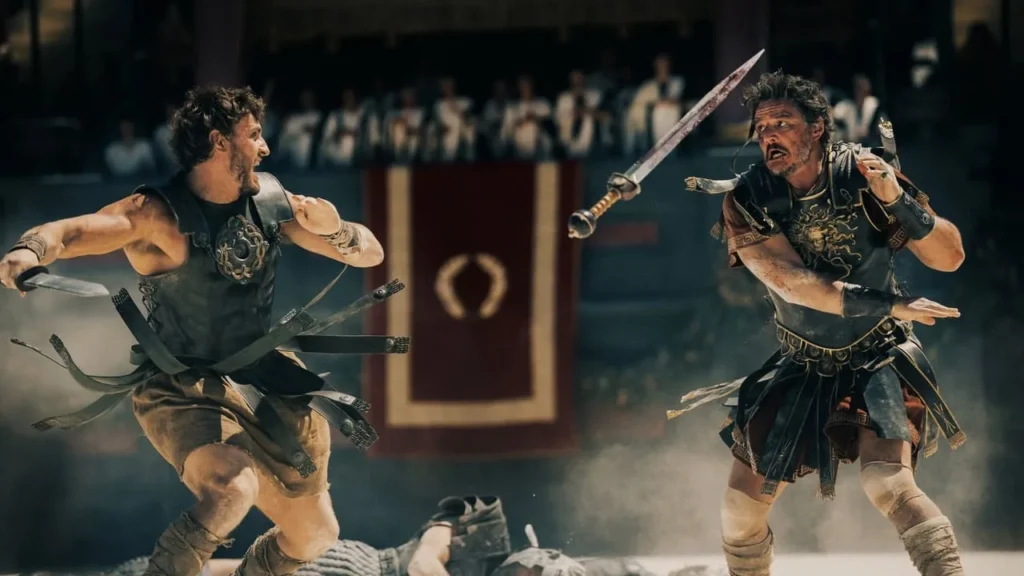
Thematically, “Gladiator II” explores themes of power, legacy, and vengeance, much like the original. However, it attempts to weave in additional layers of personal and political conflict, which has been a point of both praise and criticism. Critics from The Hollywood Reporter commend the film for its ambitious thematic scope, while others argue that it results in a narrative that feels overstuffed and fragmented. Viewers on Reddit have engaged in extensive discussions about the film’s thematic ambitions, with opinions split on whether the added complexity enriches the story or muddles its focus.
In terms of historical accuracy, “Gladiator II” maintains a commitment to the grandeur and brutality of ancient Rome, though, like its predecessor, it takes creative liberties for dramatic effect. Scholarly reviews on History Today recognize the film’s effort to depict the era’s opulence and conflict, while also noting the fictional elements that enhance the storytelling. History enthusiasts among the audience appreciate the detailed set designs and costumes, even if they acknowledge the artistic license taken in certain plot elements.
Overall, “Gladiator II” presents a visually stunning and ambitious sequel that strives to honor the legacy of its predecessor while forging its own path. With standout performances, particularly from Denzel Washington, and breathtaking visual effects, the film has garnered a mix of admiration and critique. Whether it lives up to the high expectations set by the original “Gladiator” depends largely on individual viewer preferences regarding story complexity and character development versus epic spectacle.
Frequently Asked Questions About Gladiator II
What is Gladiator II about?
Gladiator II continues the legacy of the original film by following the story of Lucius Verus (Paul Mescal), the son of Lucilla and nephew of Commodus. Set in ancient Rome, Lucius navigates the perilous political landscape and finds himself drawn into the gladiatorial arena, mirroring the journey of Maximus from the first movie. The film delves into themes of power, legacy, and vengeance, expanding the universe with new characters and complex narratives.
Who are the main cast members in Gladiator II?
The film features a star-studded cast, including Paul Mescal as Lucius Verus and Denzel Washington in a standout role as Macrinus. Pedro Pascal, Joseph Quinn, and Connie Nielsen reprise her role as Lucilla, adding depth to the ensemble. Washington’s performance has been particularly praised, with many critics highlighting his ability to convey complex emotions[[Rotten Tomatoes].
How does Gladiator II compare to the original Gladiator?
While Gladiator II aims to honor the original’s legacy, opinions are mixed. Critics from Metacritic acknowledge the film’s visual grandeur and strong performances but feel it occasionally lacks the emotional depth and narrative coherence that made the first film a classic. Viewer feedback on IMDb reflects a similar sentiment, appreciating the fresh storyline while missing some of the original’s raw intensity.
Who directed Gladiator II?
Ridley Scott, the visionary behind the original “Gladiator,” returns to helm the sequel. His direction is praised for its attention to detail and ability to recreate the splendor of ancient Rome. However, some critics from The Guardian feel that while Scott excels in visual storytelling, the film sometimes prioritizes spectacle over substance.
Where can I watch Gladiator II?
You can stream Gladiator II on mustwatch.cc, a platform that offers high-quality streaming and a user-friendly interface, making it easy to immerse yourself in the epic drama of ancient Rome.
How are the visual effects in Gladiator II?
The visual effects in Gladiator II are a standout feature, benefiting from advancements in technology since the original film. IGN praises the CGI for enhancing the storytelling, particularly the intense battle sequences and sweeping cityscapes. However, some critics argue that the effects can sometimes be overwhelming, detracting from the character-driven aspects of the plot.
What have critics said about Gladiator II?
Critics have given Gladiator II a mixed reception. While many praise the film’s visual spectacle and strong performances, especially by Denzel Washington, others criticize its convoluted storyline and lack of emotional depth compared to the original. Variety highlights the impressive performances and grand scale, whereas CinemaBlend points out the occasional narrative inconsistencies.
Is Paul Mescal’s performance in Gladiator II well-received?
Paul Mescal’s portrayal of Lucius Verus has been generally well-received, with critics from Rotten Tomatoes appreciating his ability to bring nuanced depth to the character. However, some reviewers on Metacritic feel that Mescal occasionally lacks the commanding presence that Russell Crowe brought to Maximus, leading to a mixed reception among audiences on platforms like IMDb.
How is Denzel Washington’s role in Gladiator II?
Denzel Washington’s role as Macrinus is a highlight of the film, with many critics describing his performance as Oscar-worthy. His ability to convey both gravitas and intensity adds a rich layer to the narrative, making his character both formidable and empathetic. Reviews on Variety and The Hollywood Reporter consistently praise Washington for elevating the film with his outstanding portrayal.
What themes are explored in Gladiator II?
Gladiator II explores themes such as power, legacy, and vengeance, much like its predecessor. Additionally, it delves into personal and political conflicts, aiming to build a more complex world. While some critics on RogerEbert.com commend the film’s ambitious thematic scope, others argue that the added complexity can make the narrative feel overstuffed and fragmented.
How is the soundtrack of Gladiator II?
The soundtrack of Gladiator II, composed by Hans Zimmer in collaboration with Lisa Gerrard, has been widely praised for its powerful and evocative themes. The music effectively enhances the emotional and dramatic moments of the film, providing a sonic backdrop that complements the on-screen action. Fans have lauded the score on platforms like Soundtrack.net, highlighting its grandeur and emotional resonance.
How is the pacing in Gladiator II?
The pacing of Gladiator II has been a point of contention among both critics and audiences. While some sections, particularly the gladiatorial combats and political intrigue, are praised for their intensity, other parts of the film are criticized for being uneven and dragging. Reviews on Empire Online note that certain segments disrupt the film’s overall flow, leading to a mixed viewing experience.
Does Gladiator II maintain historical accuracy?
Gladiator II maintains a commitment to depicting the grandeur and brutality of ancient Rome, though it takes creative liberties for dramatic effect. Scholarly reviews on History Today recognize the film’s effort to portray the era’s opulence and conflict while acknowledging the fictional elements that enhance the storytelling. History enthusiasts appreciate the detailed set designs and costumes, even if they understand the artistic license taken in certain plot elements.
How does the supporting cast contribute to Gladiator II?
The supporting cast, including Pedro Pascal, Joseph Quinn, and Connie Nielsen, plays a crucial role in adding depth to the Roman narrative. While Pascal’s charismatic presence and Quinn’s dynamic energy are highlighted as strengths, some critics feel that the ensemble lacks the cohesive chemistry seen in the original film. Discussions on CinemaBlend and Letterboxd reflect appreciation for the supporting actors’ efforts despite occasional narrative inconsistencies.
What is the overall reception of Gladiator II among audiences?
Audiences have a mixed reception to Gladiator II, with many enjoying the visual spectacle and strong performances, particularly by Denzel Washington. However, some viewers find the storyline convoluted and feel that the film doesn’t fully capture the emotional depth of the original. Platforms like Reddit showcase extensive discussions where opinions are split on whether the sequel successfully enriches the “Gladiator” universe or falls short of expectations.




I’m so excited for this sequel! The first Gladiator was a masterpiece, and I can’t wait to see how they continue the story. Ridley Scott always delivers!